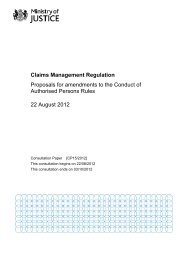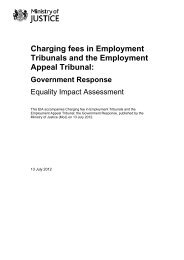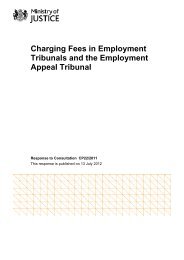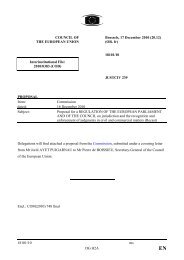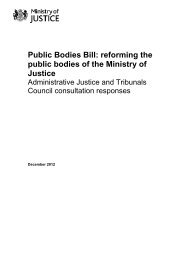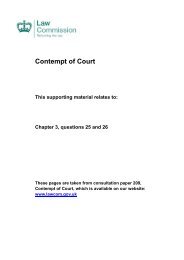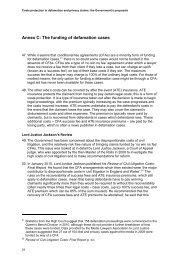Appointments and Diversity 'A Judiciary for the ... - Ministry of Justice
Appointments and Diversity 'A Judiciary for the ... - Ministry of Justice
Appointments and Diversity 'A Judiciary for the ... - Ministry of Justice
You also want an ePaper? Increase the reach of your titles
YUMPU automatically turns print PDFs into web optimized ePapers that Google loves.
<strong>Appointments</strong> <strong>and</strong> <strong>Diversity</strong> A <strong>Judiciary</strong> <strong>for</strong> <strong>the</strong> 21st Century’<br />
Response to public consultation<br />
Responses to specific questions<br />
The proper balance between executive, judicial <strong>and</strong> independent roles <strong>and</strong><br />
responsibilities<br />
Question 1: Should <strong>the</strong> Lord Chancellor transfer his decision-making role <strong>and</strong><br />
power to appoint to <strong>the</strong> Lord Chief <strong>Justice</strong> in relation to appointments below<br />
<strong>the</strong> Court <strong>of</strong> Appeal or High Court (S67, 70 - 76, 79-85, 88 – 93 <strong>of</strong> CRA)<br />
18. Overall <strong>the</strong>re were 35 responses to this question. Of those 24 were in favour with<br />
eight against, while a fur<strong>the</strong>r three did not express a clear opinion. Consultees were<br />
generally clear that if a transfer did take place, <strong>the</strong> Lord Chancellor should retain<br />
responsibility <strong>for</strong> High Court appointments <strong>and</strong> that, <strong>the</strong>re<strong>for</strong>e, <strong>the</strong> correct dividing line<br />
<strong>for</strong> transfer <strong>of</strong> appointments was below <strong>the</strong> level <strong>of</strong> High Court.<br />
19. Those <strong>for</strong> <strong>the</strong> transfer argued that <strong>the</strong> transfer would, from a constitutional<br />
perspective, help delineate <strong>the</strong> separation <strong>of</strong> judiciary <strong>and</strong> executive. It was also<br />
considered that from a practical perspective, delay in <strong>the</strong> appointments system could<br />
be reduced.<br />
20. The arguments put <strong>for</strong>ward by those against <strong>the</strong> proposal included a concern about<br />
loss <strong>of</strong> Parliamentary accountability, concern about public perception <strong>of</strong> an increased<br />
judicial role <strong>and</strong> <strong>the</strong> creation <strong>of</strong> two tiers <strong>of</strong> judges. It was also thought by some, that<br />
from a constitutional perspective, <strong>the</strong> current arrangement was appropriate <strong>and</strong> from<br />
a practical perspective if a transfer <strong>of</strong> powers did take place that careful consideration<br />
would need to be given to consequential impacts on <strong>the</strong> appointment process (e.g.<br />
statutory consultation), including <strong>the</strong> principle that whoever made <strong>the</strong> decision would<br />
be constrained as <strong>the</strong> Lord Chancellor is currently required to accept a selection by<br />
<strong>the</strong> JAC, to reject it or to ask <strong>the</strong> JAC to reconsider a selection.<br />
21. In <strong>the</strong>ir report, <strong>the</strong> House <strong>of</strong> Lords Constitution Committee made <strong>the</strong> following<br />
recommendation in relation to this proposal:<br />
In order to maintain public confidence in <strong>the</strong> system, <strong>the</strong>re is a need <strong>for</strong> <strong>the</strong> legal<br />
framework <strong>for</strong> appointments to reflect both <strong>the</strong> extent to which <strong>the</strong> executive should<br />
be involved in individual appointments <strong>and</strong> <strong>the</strong> reality <strong>of</strong> that involvement. We agree<br />
that <strong>the</strong> power to request reconsideration or reject nominations should be transferred<br />
from <strong>the</strong> Lord Chancellor to <strong>the</strong> Lord Chief <strong>Justice</strong> in relation to appointments below<br />
<strong>the</strong> High Court. This will promote <strong>the</strong> independence <strong>of</strong> <strong>the</strong> judiciary <strong>and</strong> increase<br />
public confidence in <strong>the</strong> system. Whe<strong>the</strong>r <strong>the</strong> Lord Chancellor’s powers in respect <strong>of</strong><br />
High Court appointments should be transferred to <strong>the</strong> Lord Chief <strong>Justice</strong> should be<br />
reviewed in three to five years’ time.<br />
Paragraph 34, 25th Report <strong>of</strong> Session 2010–12, Judicial <strong>Appointments</strong><br />
22. Based upon <strong>the</strong> analysis <strong>of</strong> <strong>the</strong> responses <strong>and</strong> <strong>the</strong> views expressed by <strong>the</strong><br />
Constitution Committee we will transfer <strong>the</strong> Lord Chancellor’s current role, in<br />
making <strong>the</strong> selection decision in relation to particular courts-based<br />
appointments below <strong>the</strong> High Court, to <strong>the</strong> Lord Chief <strong>Justice</strong>. The Lord<br />
Chancellor will retain his current role in recommending to HM The Queen those posts<br />
9



